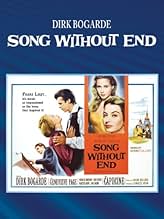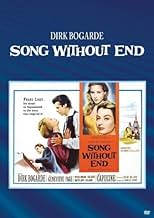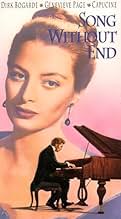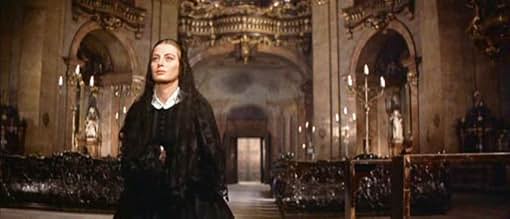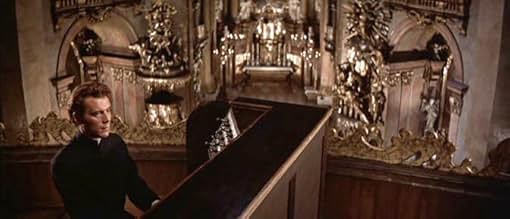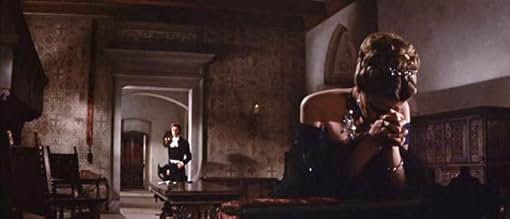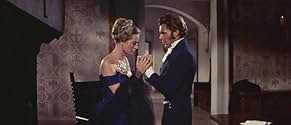Füge eine Handlung in deiner Sprache hinzuThe romantic story of Hungarian pianist Franz Liszt (Sir Dirk Bogarde), whose scandalous love affair forced him to abandon his adoring audiences.The romantic story of Hungarian pianist Franz Liszt (Sir Dirk Bogarde), whose scandalous love affair forced him to abandon his adoring audiences.The romantic story of Hungarian pianist Franz Liszt (Sir Dirk Bogarde), whose scandalous love affair forced him to abandon his adoring audiences.
- Regie
- Drehbuch
- Hauptbesetzung
- 1 Oscar gewonnen
- 2 Gewinne & 3 Nominierungen insgesamt
- Thalberg
- (as E. Erlandsen)
- Chopin
- (as Alex Davion)
- Emissary
- (Gelöschte Szenen)
- Audience Member
- (Nicht genannt)
- Komparsenrolle
- (Nicht genannt)
Empfohlene Bewertungen
The film only covers part of Liszt's life and concentrates (naturally) on the turmoil in his love affairs, which leads to his attempt to marry the already married Princess Carolyne Wittgenstein; he left his married girlfriend, Countess Marie D'Agoult, the mother of his children for her. (One of his daughters, Cosima, married Richard Wagner, who features in this film.) I disagree with a previous comment complaining about the way Liszt is portrayed. While it's not emphasized, it is obvious that he was a man of great charity, donating many of his fees to various organizations, and playing many benefit concerts. Later on, he concentrated on composing, at which he was very successful. As a performer, Liszt was a bona fide rock star in his day, complete with hysterical fans. He was most certainly attractive to women and religiously conflicted.
Dirk Bogarde does a sensational job as Liszt. This and "The Angel Wore Red" were his only Hollywood films. Even if they had been successful, it's doubtful Bogarde would have stayed in the states, as he probably wouldn't have been cast in the kinds of films he wanted to make and/or the kinds of parts he wanted to play. He makes a very romantic, intense Liszt, and his fingerings are nothing short of amazing. Capucine is good, if a little wooden, as Carolyne. The supporting cast is very good.
The production and costumes are opulent, but they are dwarfed by the music. Definitely some of the most brilliantly performed classical music in film.
Highly recommended for classical music lovers.
What the movie is, which will polarize viewers, is a thorough opportunity to experience music by great composers as they might in the mid-1800s. No less than 40 musical interludes occur, and unlike today's music biopics, these are not small moments, they nearly all play uninterrupted! This makes for a bloated runtime well over 2 hours, but a rare immersive opportunity to sit and listen to an actor portraying a master performer/composer as a recreation of their era. Read the reviews on IMDb and you'll see viewers either hate this or love this depending on their passion for the music itself. And the movie feels to be 70% concerts, which makes an inevitably weary experience that sacrifices a more deft plot.
Peculiarly, the movie features startlingly low percentage music by Liszt himself. It is a well done plot point that Liszt was a champion of his peers, and helped Chopin, Wagner, and others reach fame they wouldn't have without a master performer like Liszt showcasing their work. But this is intentional to the story. The finest example is a scene where Liszt is playing Chopin on the piano in the background, while Chopin's lover and Liszt's lover discuss their merits as composers vs. performers in the front of the scene. Cinematic subtext to perfection. The Liszt inner debate of whether he was a superior composer or performer is a major plot point. I love these components of the plot, for they shed light on who Liszt was in a way that a Wikipedia article never could. And yet, they're overshadowed by the main draw.
The main story is about Liszt's multiple lovers and the challenging decisions that come with this. It's 1960, so discussion of love, sex, and marriage is very reserved. Only 15 years later, Lisztomania has Roger Daltery playing Liszt as a sex-fueled rocker; this one makes his romances a true conflict of faith. It's great material, but definitely dated in its more calm approach.
Director Charles Vidor died early into production, and was replaced by legendary director George Cukor, who it appears was determined to stay within Vidor's vision of a music biography. The result is something slightly authorless: it's a grand period epic, with little outstanding choices, give or a take a few cool shots. If this were released today, it would get roasted for being thin on story and heavy on music sequences without enough subtext behind them.
The film is shot in Cinemascope but the DVD version I have is shoddy at best. This is a perfect example of an old movie that may get forgotten by time and will not get the 4K restoration reserved for classics such as Gone With the Wind, or Criterion essentials of the highest caliber. Makes you wonder what movies will disappear in time. Had I not been studying the work of Chopin & Liszt, I would have never watched this, especially given it wasn't well reviewed to begin with. And yet, despite its flaws, there is plenty to glean from it, mostly for classical piano buffs, but perhaps for others as well.
(Side note: I do wish I could access a list of all the names of the pieces, they don't always make an effort to tell you what is what. It isn't mentioned in the film, though I learned in my own research, that Liszt's championing of Beethoven, the equivalent of a celebrity endorsing an under-appreciated artist today, is what has elevated Beethoven to superstardom. That could be a movie in of itself)
Charles Vidor's "Song Without End" (finished by George Cukor after Vidor died during production) looks at a period of Liszt's life. It sounds as though his scandalous personal life became as famous as his music. Sure happens with a lot of musicians.
Anyway, Dirk Bogarde plays Liszt, and Capucine plays the princess with whom he fell in love. Their love affair was what you might expect (but make no mistake, Capucine was a real babe). However, my interpretation of this movie got colored by the use of the music in cartoons. Richard Wagner is a character in the movie, and we hear the Pilgrims' Chorus from Wagner's Tannhäuser; I recognized the tune from the scene in Chuck Jones's "What's Opera, Doc?" where Bugs dresses as a Rhinemaiden to fool Elmer. I bet that my generation learned most of the high-brow culture (opera and literature) from the Looney Tunes without knowing that it was a spoof.
Anyway, it's an OK movie, not great. I guess that you could put it on your, ahem, Liszt of movies to see.
'Song Without End' is certainly much better than Ken Russell's 'Lisztomania', a very hard to rate film that was visually striking but ruined by gratuitous excess and lack of taste, and does have many pleasures but biographically it disappoints.
It is a visually sumptuous film for starters, it's very beautifully photographed, the costumes are lavish, richly colourful and true to period and the settings, interiors and scenery are gorgeous to watch. The music is definitely the highlight of 'Song Without End', whether it is bombastic and energetic like the second 'Hungarian Rhapsody' or intimate and poignant like the third 'Liebestraume', and it's all cleverly arranged. Contrary to one reviewer the inclusion of music of other composers was quite nice though there could have been a little more of Liszt's, 'Totentanz' would have been absolutely thrilling to listen to.
One mustn't forget the magnificent playing of Jorge Bolet, absolutely agree that it is some of the best-performed classical music in film. Liszt's music is fiendishly and notoriously difficult for a pianist ('Totentanz' for example is hard enough with piano and orchestra, in solo piano version it's a killer), but Bolet , with such energetic, hugely musical and poetic playing, makes it sound effortless. 'Song Without End' is nicely directed, and never resorts to vulgarity or excess. While its representation of Liszt is not exactly a faithful one (one doesn't find it easy to believe him as that much of a womaniser, almost too much on the slightly sleazy side, and especially as a prima donna), it is not the literal character assassination of 'Lisztomania', because it also gets some things right like he was a man of great charity, was highly noble and women were attracted to him). 'Song Without End' is also not without its powerful and affecting moments, and the music plays an enormous part in why that is, the fact that Liszt played the music of other composers as well and that he was a fan of Chopin is incorporated remarkably intelligently.
The cast are very good. Whether one takes issue with how Liszt is portrayed, it cannot be blamed at Dirk Bogarde's door but how he's written. Bogarde does an excellent job, and is very believable and charismatic whether amorous or more intense in the context of how Liszt is written and as a performance in general. Genevieve Page and especially Capucine are breathtakingly beautiful, and Page also plays the film's most sympathetic character very poignantly. Martita Hunt is also memorable, Hunt as is evidenced by her definitive Miss Havisham in David Lean's classic 'Great Expectations' had a knack for stealing scenes regardless of the size of the role. Bogarde and Capucine and particularly Bogarde and Page also convince together, quite touching in fact at times.
For all its many good things, 'Song Without End' is not without its flaws. There is an exception to the high standard set by the cast, and that is agreed the miscast and out of place Lou Jacobi, whose appearance and the way he spoke being somewhat anachronistic and jarring. The film does drag in places, getting bogged down by a few strands like the greatly and too obviously romanticized romances (that are also factually distorted, the film fails to mention the Countess' emotional problems before meeting Liszt and how big a part it played in their break up).
The story here is compelling but some things that were included could have been elaborated on in more detail. While there are some things that are faithful- like his devotion for art- it is every bit as easy to spot the inaccuracies and anachronisms, like the notion of Liszt feeling inferior to Chopin with the existence of his 'Transcendental Etudes' being long before he even met Chopin . It does focus too much on the romantic side of his character and not enough on his magnetic way of performing he held that earned him the admiration of several other fellow performers (it does focus on a small portion of his life and unfortunately it is not the most compelling or the most telling of Liszt's character). Lastly, some of the script is flimsy with some soap-opera-like dialogue and areas that were potentially interesting but lack depth.
All in all, disappointing in some areas but also a film of many pleasures. 6/10 Bethany Cox
Wusstest du schon
- WissenswertesCharles Vidor had completed about 15 percent of this movie when he died of a heart attack on June 4, 1959. Sir Dirk Bogarde later recalled that he was "secretly relieved" by Vidor's death, since he and his co-star, Capucine had been treated badly by the short-tempered director. Vidor would often scream at Capucine to relax, and at one point, Bogarde recalled, "shook her like a dead cat." Vidor was replaced by George Cukor, who got along much better with his stars, and was more of an "actor's director."
- PatzerGrand Duchess make reference to "Ukraine" in one scene. The term was not in wide use in the 1840s, especially not among Russian nobility.
- Zitate
Countess Marie: I met Franz at a musical party. I remember he played a ballade in A-flat major by Chopin. I thought I'd never seen anything as beautiful as Franz looked when he sat at the piano. I... I wanted to cry. He watched me as he played; Franz never fails to notice a pretty woman in his audience. Afterward, he followed me into the hall. I remember he said, "May I escort you somewhere, madame?" And I said, "Yes." And he said, "Where?" And I said, "Paradise." He didn't smile - he said, "I'll call a carriage."
Princess Carolyne: Did he?
Countess Marie: What?
Princess Carolyne: Drive you there - to paradise?
Countess Marie: [a pause, and a meaningful look as she turns to leave the room] He doesn't know the road, madame.
- VerbindungenFeatured in Film Profile: Dirk Bogarde (1961)
Top-Auswahl
- How long is Song Without End?Powered by Alexa
Details
- Laufzeit
- 2 Std. 21 Min.(141 min)
- Seitenverhältnis
- 2.35 : 1


